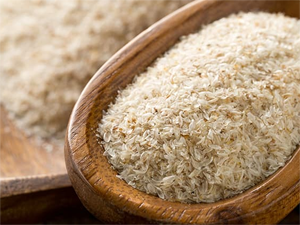WHAT IS FIBER? WHAT IS THE DIFFERENCE BETWEEN SOLUBLE AND INSOLUBLE FIBER?
Fiber is mostly made up of carbohydrates. However, unlike the usual carbohydrates found in bread and other foods, our body can’t digest fiber. In spite of this, fiber helps keep our digestive system running smoothly and helps improve overall health. Meat does not have fiber. Fiber is found only in plant foods.
There are two main categories of fiber: insoluble and soluble. Insoluble fiber doesn’t dissolve in water, while soluble fiber does.
Insoluble fiber is mostly found in whole-wheat foods, bran, nuts, and seeds. It helps our bowels by forming the mass that moves through our digestive system and is key to preventing some digestive conditions such as diarrhea and constipation.
Soluble fiber is mainly found in fruits, vegetables, and psyllium husk, to name a few. It becomes gel-like in water, and is key to helping stools move smoothly through the intestines.
Each type of fiber has its own impact on our digestion and overall health, and we require both in our diets.
HOW MUCH FIBER DO WE NEED PER DAY?
The U.S. Government Dietary Guidelines 2015 recommend that women need about 25 grams of fiber a day, and men need slightly more—about 30 grams per day.
Simply put, there’s a popular saying: “An apple a day keeps the doctor away.”
In addition to plentiful phytochemicals and antioxidants, one apple, with the skin, contains about 4.4 grams of fiber. Without the skin, you’re only getting about 2.1 grams.
More accurately, the saying should be: “10 apples a day keep the doctor away.”
HOW DOES FIBER HELP WITH WEIGHT LOSS?
Fiber is a well-known natural slimming aid and works through various methods.
Weight loss is all about taking in fewer calories than you burn. Fiber can curb your appetite and help you feel full, so you’ll eat less and take in fewer calories. Even better, fiber has no extra calories! One of the hormones that controls the feeling of fullness is called cholecystokinin (CCK). Fiber helps increase the production of CCK and keeps it acting longer. This means that a diet high in fiber will leave you feeling fuller for longer.
Research done by the U.S. Department of Agriculture showed that people who consumed up to 36 grams of fiber a day absorbed about 130 calories less.
Fiber is a low-energy-dense food. By eating more fiber, you help crowd out the less-healthy calories and overall, reduce your caloric intake. One study showed that just adding one kind of soluble fiber to a diet reduced food intake by 11%!
HOW IS FIBER GOOD FOR OUR DIGESTIVE SYSTEM?
Fiber is essential for our digestive system to run smoothly. Fiber helps clean our digestive system by gently scraping the walls of our intestines and collecting small particles so that they are removed from the body.
Soluble fiber is metabolized by our bacteria, and can help stimulate the growth of healthy bacteria in our intestines.
The two types of fiber work in synergy to maintain the health of our bowels and help us keep regular bowel movements. Fiber prevents constipation, and reduces the risk of hemorrhoids and diverticulosis.
DOES FIBER HELP THE FUNCTION OF THE IMMUNE SYSTEM?
A diet high in fiber affects immune cells and antibodies, and potentially boosts immune function. A study done shows animal models that ate soluble fiber fell ill 50% less often than their counterparts and recovered 50% faster.
By helping to remove toxins from the bowels, fiber prevents such toxins from affecting the lining of our intestines, and from being absorbed into the body and affecting our other organs, such as the liver. This gives us many additional benefits, such as having more beautiful, clear skin!
HOW DOES FIBER HELP PREVENT HEART DISEASE AND TYPE 2 DIABETES?
Fiber helps slow the conversion of carbohydrates into sugar. In this way, high-fiber foods can help control your blood sugar levels as well as increase your sensitivity to insulin. Some studies show that a high-fiber diet reduces the risk of type 2 diabetes.
Soluble fiber is broken down by the healthy bacteria in our intestines and produces short-chain fatty acids. Short-chain fatty acids have a number of benefits. They have been shown to affect insulin release from the pancreas and breakdown in the liver leading to stable glucose levels. They also affect the liver’s production of cholesterol, leading to lower circulating cholesterol in the blood.
Due to the effect of lowering blood cholesterol levels, a high-fiber diet is also linked to a reduced risk of heart disease. Several large studies have found that a high-fiber diet can lower the risk of heart disease by up to 40%. In fact, the U.S. FDA has released a statement recognizing that a diet rich in soluble fiber “may reduce the risk of heart disease, a disease associated with many factors.”
HOW DOES FIBER HELP PREVENT COLON CANCER?
As fiber helps keep our bowels moving in a timely manner, it will reduce the time potential toxin-causing agents have in contact with the walls of the colon. It is believed that the longer the toxins are in contact with the cells, the greater the risk of the cells becoming cancerous. In addition, when bacteria in the intestines break down fiber, a substance called butyrate is produced, which may inhibit cancer cell growth.
A study done in Europe shows that those who consume an average of 35 grams of fiber daily have a 25% lower risk of developing colon cancer compared to those who consume only about 15 grams of fiber daily. The results of the study suggest that those who don’t eat enough fiber could reduce their risk of colon cancer by up to 40% just by eating 50% more fiber.
IS COLON CLEANSING NECESSARY AND IS IT HEALTHY?
Colon cleansing does more harm than good.
A review of studies done by The Journal of Family Practice shows that colon cleaning does not improve health and does not promote weight loss. There is much evidence showing that colon cleansing is associated with bloating, vomiting, and cramping.
Taking regular laxatives or using regular colon cleanses is habit-forming and can lead to the development of a lazy bowel. Think of it this way: if you are constantly doing the job of your colon for it, why should it work? A lazy bowel means that your colon is slow to work. This leads to a low frequency of bowel movements, constipation, bloating, and nausea.
More severe cases of harm with colon cleansing involve renal failure due to damage from the clogging of the kidneys and electrolyte imbalances, and in some cases, even death. Some colon cleanses involving some medicinal herbs have also been linked to liver toxicity and blood disorders.
The idea of colon cleaning is trendy, but doesn’t do anything to improve your health. The American Medical Association has even stated as early as the 1900s that the “procedure was invalid.”
Your body comes well equipped with its own mechanisms to eliminate harmful substances. If you feel constipated, or feel the need to get rid of toxins lurking in your gastrointestinal tract, the best way to do this is to eat plenty of fiber.
EATING A LARGE AMOUNT OF FIBER IS GIVING ME GAS AND BLOATING. IS THIS NORMAL?
Most people do not have enough fiber in their daily diet. In the USA, most people only eat about 15 grams of fiber every day.
As you start to increase the amount of fiber in your diet, bloating and gas is common. The bloating and gas is due to the healthy bacteria in your intestines working to break down this extra fiber while battling the other bacteria.
Making healthy changes takes time. Instead of stopping your high-fiber diet, you should persist and allow your body to adjust to the increase in fiber.
Source: Dr EE Zhang, eLead Global, EExplanations, Fiber




